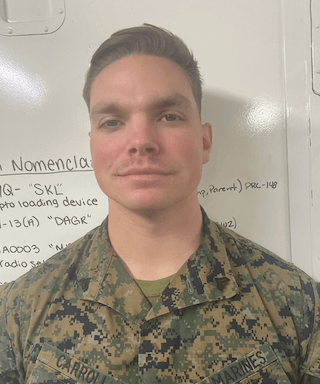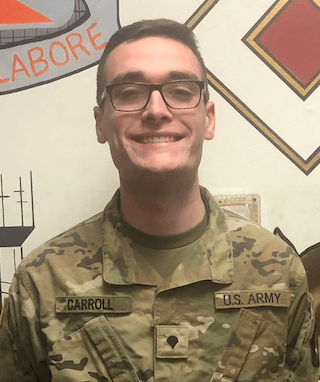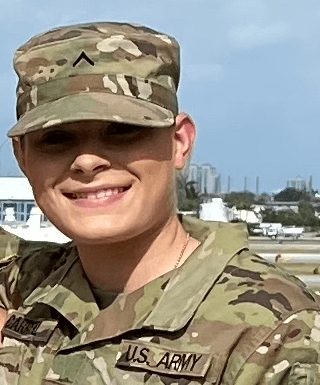Talent Acquisition, Team Members
There has been a definite shift in the way work is done now. Traditional, static teams populated by people in traditional, static jobs are few and far between. In their place is a move towards a more liquid workforce – dynamic teams populated by people with skills that fit the work to be done rather than an outdated job description.
With this shift comes a greater focus on skill sets – and skills can be obtained in a number of ways. We’re seeing the accepted path of going from high school, to college, to entry-level position, to a promotion isn’t necessarily what’s happening in the world today. More and more people are opting for a “non-traditional” career path.
This is a topic that is near and dear to our hearts at IA, as we have direct access to three people who are following their own path. Kimberly Carroll, managing principal at IA, has three children who chose to enlist in the Armed Services, either immediately after high school or after trying college for a short time. All three have appreciated the experience and what they have learned, and we thought it would be helpful to gain their perspective on a non-traditional career path.
What follows is a summary of our group conversation about their decision to enlist and how it has impacted them.
Quick Review of Who’s Who



(yes, Jake and Abby are twins)
Making the decision
The first question posed was around the process of deciding to join the service. All three shared that they didn’t feel like they were ready for college right after high school, even though they had the grades and opportunity to go. Matt attended school for one year before realizing it wasn’t for him. Both Jake and Abby thought through their options throughout their senior year. Despite opportunities for college scholarships, both chose the service because they recognized they just weren’t ready to go back to school. Jake acknowledged that he didn’t have the discipline to be successful at the time, and Abby wanted time away from school after working hard for four years.
Fun fact: Matt and Jake ended up in their current branch of service not because it was their first choice, but because it was the only recruitment office that was open when they started the process.
Matt knew he would gain skills in the service, ones that would serve him well once he decided his time in the armed forces was over. He and his siblings acknowledged that there is a lot of pressure on high school students to go to college immediately after graduation, despite the fact that many seniors don’t really know what they want to do with their lives.
It was interesting to hear how many of their peers were shocked Jake and Abby didn’t want to go to college. Both mentioned friends questioning whether they had the grades to get in (both could have gotten substantial scholarships either because of academics or athletics). It highlighted the pressure graduating seniors feel to do what is expected rather than what is right for them at that point in their lives.
Kimberly was particularly proud of her children’s thought process throughout. She shared, “My father was in the service for 23 years, so I grew up in that environment, and I married a marine. So, it’s easy for me to be like, oh, send your kids to the service. Even though I grew up in the service, my husband and I did not make this decision for our kids, it really was their decision.” Throughout her career, Kimberly has seen employees go straight from getting a degree and going into the workforce, and while that works for some people, some of these workers have limited skills and life experiences. Kimberly reiterated that all paths could lead to success: “It is about building the skills necessary to be successful in your career. It’s either through college or not through college. My children are going through the service to build skill sets that are more tactical at this point and are planning on college at a later date.”
The benefits of joining the service
When asked whether they considered taking a year off to work before deciding, none saw it as a viable option. As Abby put it, “Why work part-time at Dunkin Donuts when you can get benefits and a full-time job in the Army?” All three highlighted the benefits of being in the service, whether it’s health benefits, training, social experience, or education.
Matt shared that he has learned several skills that will support him when he enters civilian life. He has been working in communications, which is very technically oriented, and recently finished a course in micro-soldering. He is confident that these skills will help him find a position in a communication field, potentially for the Department of Defense or a civilian contract.
Jake has already started working towards a degree in aeronautical engineering, and Abby has started coursework towards her dream of being a detective. They are both grateful that they can go to school and be in the service at the same time, gaining life skills and an education, all without incurring debt. The trio pointed out that they all have a minimum of secret security clearance – something that could definitely set them apart from other candidates when they start job seeking.
When asked what are some skills they’ve already started learning since being in the service, all three replied that they have learned to work with people of all types – different backgrounds, different personalities, maybe some they don’t even like. But there is a shared purpose and community that being in the service brings, and that has helped all three find common ground. Matt says he has been places he never would have visited and has made lasting connections with people he never would have met. Abby is learning patience and how to navigate coworkers, and Jake shared that as a strong introvert, the Army has helped him improve his interpersonal skills – “I definitely think I’ve gotten a little bit better at dealing with people and knowing when to shut my mouth and not say anything.”
Looking towards the future
Matt has been in the Marines for a while but has begun the process to transfer to the Army. His goal is to fly helicopters through the Warrant Officer Flight Training program and should finalize the move later this year. He appreciates his time in the Marine Corps but doesn’t want to be stuck working behind a desk. The military supports this type of transfer, by the way, in case anyone reading this is curious.
Jake and Abby are one year into their first four-year contract with the Army. So far, they love it. Abby acknowledges some of that may be tied to the fact that she’s based in Hawaii, but she likes her work and the fact that she’ll be able to take advantage of the benefits the Army affords her. She doesn’t think she’ll make a full career of being in the Army, but she can also see signing another contract once this one is up. “It’s a lot of hard work and long hours, but it’s all worth it,” said Abby. “At the end of the day, the benefits are worth it.”
Jake’s goal is to go the officer route and stay in until he can retire from the service at the age of 38. He will need to complete his degree to qualify, but he is already well on his way. He appreciates the fact that he can get his degree for free and gain other skills along the way and is looking forward to his career in the service.
Final thoughts
When asked if there were any regrets about their decision to join the service, all three were adamant that they made the right choice. Matt’s only regret was that he didn’t enlist immediately after high school. Abby likes the path she’s on and the work she is doing. Jake appreciates that he is gaining the discipline he needed to be successful in his studies. While each acknowledged that the service is hard work and you’ll do things you don’t enjoy, all three were remarkably positive about their experiences so far and were incredibly open about why they made the choice that was best for them.
Kimberly had some advice for parents watching their children go through the decision-making process – be open to the possibility. She stressed that she does believe college is important, and it’s great for people to get their degrees. But she has also seen the growth of life skills that people gain in the military that you don’t necessarily gain in college. She acknowledged that growing up in a military family (her father served) and marrying a Marine meant that she didn’t have as much fear of the unknown that other parents may have. Kimberly simply hopes parents will let their children go down this path if college is not right for them.
Thank you
The conversation was longer and more fun than what we can adequately share here. A sincere “thank you” to Matt, Abby and Jake for their service, and an equal “thank you” to Kimberly and her husband Jason for their support of their children. We will continue to check in with the Carrolls as they follow their path to success.







Pingback: Leadership Development Carnival March 2022 - Julie Winkle Giulioni